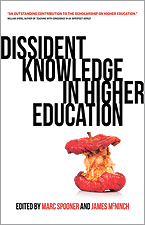
Marc Spooner & James McNinch (eds).
University of Regina Press, 2018; 319 pp;
ISBN: 978-0-88977-536-7.
By Robin Whitaker
Dissident Knowledge in Higher Education originated in “Public Engagement and the Politics of Evidence in an Age of Neoliberalism and Audit Culture,” a 2015 symposium held at the University of Regina and co-chaired by the editors. Seeking to diagnose and disrupt academia’s status quo, the book straddles tensions between universities’ longstanding service to privilege and power and the space they offer for thinking otherwise.
The book proceeds through four sections: “Historical Perspectives and Overview”; “Activism, Science, and Global and Local Knowledge”; “Theorizing the Colonial Academy and Indigenous Knowledge”; and “From Counting Out, to Counting On, the Scholars.” Zeus Leonardo’s Foreword and Peter McLaren’s Afterword situate the project in Trump-era political economy and culture.
Contributors converse across sectional divisions as key problems echo through the volume, chief among them the corruptive triad of “managerialism, marketing and measurement,” in Norman Denzin’s neat phrase (42). Thus, Yvonna Lincoln’s critique of how routinized accountancy substitutes counting and ranking for assessments of scholarly “power or creativity or insight” (13) is buttressed by Michelle Fine’s analysis of the harm wrought by “punitive accountability” in public schools and universities. Fine notes how a corporatized politics of “evidence” of performance gaps is decontextualized from structural circumstances and used to redeploy resources away from materially supporting teachers and students to assessing them. Rosalind Gill documents the physical and psychosocial costs of intense — and intensely tenacious — academic individualism and insecurity.
While many contributors track negative changes, Dissident Knowledge posits no golden age of higher education. Budd Hall recounts medieval universities’ role in dispossession. Enclosing knowledge alongside land, he calls them agents of “epistemicide” (86), a legacy that compels what Linda Tuhiwai Smith names, in a beautifully polyvalent term, an Indigenous scholarship of recovery. Smith’s examination of the paradoxes of “impact” for Indigenous research reminds us that, however neoliberalism has diminished it, the “old liberal university also defined and measured ‘performance’” in terms reflecting its “imperial and colonial foundations” (38).
For Eve Tuck, “the neoliberalization and privatization of the university [is] an extension of its settler colonial imperatives” (155). Sandy Grande works from a present tense “theorization of the academy as an arm of the settler state” (171). And Marie Battiste challenges any temptation to Canadian smugness with an account of how often Indigenization projects reflect attempts to increase academic market share and fail to recognize Indigenous diversity, treaty rights and the implications of the Truth and Reconciliation Commission recommendations.
Dissident Knowledge consolidates a widespread sense of the public university under assault. Why have faculty not done better at pushing back? Joel Westheimer offers a partial answer to how academics become complicit in the corporatized university, chasing the brass ring of “rock star status” instead of working in common. More acutely, as Fine, Grande and others note, the risks attached to dissent are unevenly distributed. Against this backdrop, Christopher Meyers offers concrete proposals for ditching “the artificial and not rationally sustainable, but nonetheless hard and fast” (239) divisions between teaching, research and service in favour of a holistic idea of “excellent teacher-scholars” (237).
Making change may demand that we abandon familiar strategies and move beyond comfortable arenas and alliances. As Tuck says, research is not always the intervention we need. Unfortunately, the potential of organized academic labour as a vehicle for seizing (back?) our universities does not feature prominently in this book. Faculty associations, more accustomed to resisting and negotiating with administrators, may find Grande’s appeal to refuse (not reform) “the university-as-such” discomfiting. At the very least, it is time to take up Gill’s anarchist-inspired sensibility, embracing the complexity of being at once in and against the actually existing university.
_________________
Robin Whitaker is president of Memorial University of Newfoundland Faculty Association.